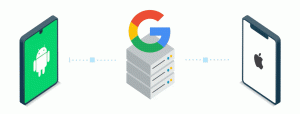

“Die Bereitstellung von Malware verlagert sich weiter in die Cloud. 61 Prozent der Malware wurde 2020 über Cloud-Apps verteilt. Im Vorjahr waren es noch 48 Prozent.
“Die große Verbreitung von Cloud-Apps in Unternehmen macht sie zu einem beliebten Ziel für Phishing-Angriffe. Cloud-Apps sind mittlerweile das Ziel von jeder dritten (36 %) Phishing-Kampagne. Während die Mehrzahl der Phishing-Köder noch auf herkömmlichen Websites gehostet wird, nutzen Angreifer jedoch zunehmend Cloud-Apps, um in Unternehmen Fuß zu fassen.”
“Das Volumen bösartiger Microsoft Office-Dokumente stieg um 58 Prozent. Angreifer setzen verstärkt auf Office-Dokumente als Trojaner, um weitere Payloads, einschließlich Ransomware und Backdoors, zu verbreiten. Durch die Bereitstellung über Cloud-Apps können dabei traditionelle E-Mail- und Web-Sicherheitslösungen häufig umgangen werden. Entsprechend machten bösartige Office-Dokumente 27 Prozent aller Malware-Downloads aus, die von der Netskope Security Cloud erkannt und blockiert wurden.”
Aber die Entwicklung hin zur Cloud nimmt in Deutschland an Fahrt auf.” >>> geldinstitute.de
“Sicherheitsrisiken in der Cloud. Hinsichtlich der IT-Security bietet die Cloud gegenüber On-Premises viele Vorteile, insbesondere für kleinere Unternehmen. Jedoch lauern auch dort einige Sicherheitsfallen. Auf welche Pitfalls gilt es zu achten? Studien zeigen eine Reihe grundlegender Konfigurationsfehler in verschiedenen Cloud-Praktiken auf.” >>> security-insider.de
Laut einer aktuellen Bitkom-Umfrage wünschen sich vier von zehn Büroarbeitern nach der Pandemie einen festen Arbeitsplatz im Einzelbüro – ins Großraumbüro will kaum noch jemand.
“the roof (of the datacenter) is on fire” zu viel BitCoins gemined?
English
(auto translated via https://translate.yandex.com/ thanks)
“Tens of thousands of mail servers hacked due to exchange vulnerability. According to US media reports, tens of thousands of e-mail servers belonging to companies, authorities and educational institutions have become victims of hacker attacks because of a security vulnerability that became known only a few days ago. “In international comparison, German companies are particularly affected by this Microsoft Exchange gap,” said Rüdiger Trost of the IT security company F-Secure on Sunday.” >>> com-professional.de
“Hackers hijack tens of thousands of surveillance cameras – including at Tesla. A small group of hackers has tapped 150,000 security cameras of a US company in recent days. Among other things, hospitals, prisons, schools and police stations were affected, but also companies such as the electric car manufacturer Tesla and even the IT security company Cloudflare”. >>> >>> dw.com
“Most of the malware comes through cloud apps. Not only are companies increasingly relying on the cloud, but attackers are also increasingly choosing this vector for distributing malware: while the number of cloud apps used per company has increased by 20 percent, 61 percent of the identified malware was distributed via cloud applications and services last year.” >>> it-daily.net
“The volume of malicious Microsoft Office documents increased by 58 percent”
“The deployment of malware is moving further into the cloud. 61 Percent of the malware was distributed through cloud apps in 2020. In the previous year, it was 48 percent.
“The proliferation of cloud apps in companies makes them a popular target for phishing attacks. Cloud apps are now the target of one in three (36 %) phishing campaigns. While the majority of phishing lures are still hosted on traditional websites, attackers are increasingly using cloud apps to gain a foothold in businesses.”
“The volume of malicious Microsoft Office documents increased by 58 percent. Attackers increasingly rely on Office documents as Trojans to spread more payloads, including ransomware and backdoors. By deploying them via cloud apps, traditional email and web security solutions can often be circumvented. Accordingly, malicious office documents accounted for 27 percent of all malware downloads detected and blocked by the Netskope Security Cloud.”
“Six federal agencies affected by cyber attack.
The BSI already warns potential victims by letter post.
Organizations of all sizes are said to be affected by the criminal attacks that exploit a vulnerability in Microsoft’s Exchange servers, including six federal agencies.
“In four cases, there has been a possible compromise,” it said in a security warning.”>>> com-professional.de
“Cloud-based email threats: Why they are on the rise in the Covid-19 crisis.
Trend Micro reports 16.7 million high-risk blocked email threats undetected by the native filters of cloud-based office solutions.
This represents an increase of almost a third compared to 2019.
There has also been a sharp increase in malware, phishing and access data theft.”>>> e-commerce-magazin.de
“German companies: No longer afraid of the Cloud.
German companies are considered hesitant in terms of cloud migration.
Even today in 2021, many of them are still not fully convinced of the cloud: one in ten companies (10%) does not use the cloud at all, almost a third still works on-premise and only uses the cloud selectively.
But the development towards the cloud is gaining momentum in Germany.”>>> geldinstitute.de
“Security risks in the cloud. In terms of IT security, the cloud offers many advantages over on-premises, especially for smaller companies. However, there are also some security traps lurking there. Which pitfalls to pay attention to? Studies reveal a number of basic configuration errors in various cloud practices.”>>> security-insider.de
Source: https://www.com-magazin.de/news/cloud-security-newsletter/cloud-security-newsletter-2644000.html
According to a recent Bitkom survey, four out of ten office workers want a permanent job in the single office after the pandemic-hardly anyone wants to go to the open – plan office.
“the roof (of the datacenter) is on fire” gemined too much BitCoins?
liked this article?
- only together we can create a truly free world
- plz support dwaves to keep it up & running!
- (yes the info on the internet is (mostly) free but beer is still not free (still have to work on that))
- really really hate advertisement
- contribute: whenever a solution was found, blog about it for others to find!
- talk about, recommend & link to this blog and articles
- thanks to all who contribute!

